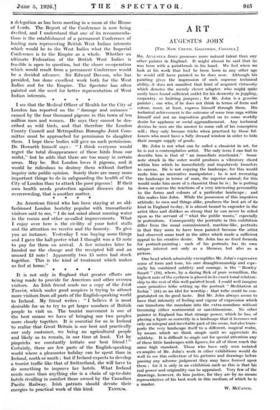A R T
AUGUSTUS JOHN
[TIIE NEw CHENTIL GALLERIES, CHELSEA.]
MR. AUGUSTUS Jowl possesses more natural talent than any other painter in England. It might almost be said that he was born with a paintbrush in his hand. We feel when we look at his work that had he been born in any other age he would still have painted as he does now. Although his painting gives the impression of such supreme technical ability, it does not manifest that kind of acquired virtuosity which denotes the merely clever adapter, who might quite easily have found sufficient outlet for his dexterity in juggling, carpentry, or knitting jumpers ; for Mr. John is a genuine painter ; one who, if he does not think in terms of form and colour, must, at least, express himself through them. His technical achievement is the outcome of some true urge within himself and not an imposition grafted on to some worldly desire for applause or social aggrandisement. Any technical devices he uses are the answer to some call of his conceptive will ; they only become tricks when practised by those fol- lowers who must have a fully dressed window in order to hide their meagre supply of goods.
Mr. John is not what can be called a classicist in art, for he is not a contemplative artist. The only term I can find to describe him is that of " an immediate reactionist." Some note struck in the outer world produces a vibratory chord within him which he immediately and impulsively transfers to canvas. He is not copying the landscape, for this would make him an uncreative manipulator ; he is not recreating the landscape in terms of man, the superior animal, for this would make him more of a classicist than he is ; he is putting down on canvas the reactions of a very interesting personality to the forms and colours of a particular landscape ; and this makes him John. While the possession of this impulsive attitude, to men and things alike, produces the best art of its kind in England to-day, it is almost bound to engender in the artist likes and dislikes so strong that he can never be relied upon as the servant of " what the public wants," especially in portraiture. Consequently the portraits in this exhibition differ from the' usual commissioned, machine-like, portraits in that they seem to have been painted because the artist had observed some trait in the sitter which made a sufficient appeal to his creative desire. Mr. John has no fixed formula for portrait-painting ; each of his portraits has its own unique interest not only as a likeness, but also as a picture.
One head which admirably exemplifies Mr. John's expressive sense of form and tone, his sure draughtsmanship and espe- cially his combined subtlety and courage, is the " Rowley Smart " (18), where, by a daring flick of pure vermillion, the highest note of the eyebrow is placed in its exact tonal relation.- ship to the rest of this well-painted head. I could well imagine some primitive tribe setting up the portrait " Meditation at Ischia " (31) as an idol for worship ; that tribe could be con- gratulated on its good taste. But Mr. John always seems to have that intensity of feeling and vigour of expression which can transform the mundane into the extra-mundane without becoming either sentimental or sanctimonious. No other painter in England has that strange power, which he has, of placing a figure so correctly in a landscape that it becomes not only an integral and inevitable part of the scene, but also trans- ports the very landscape itself to a different, magical realm, by means which we think simple until we appreciate its subtlety. It is difficult to single out for special attention any of these little landscapes with figures, for all of them reach the same high standard. Those who have only seen isolated ex amples of Mr. John's work in other exhibitions would do well to see this collection of his pictures and drawings before passing any adverse judgment they may have formed upon them ; for it is only in an exhibition such as this is that his real power and originality can be appraised. Very few of the drawings, however, do him justice, for they are by no means representative of his best work in this medium of which he it a master.
W. MCCANCE.










































 Previous page
Previous page